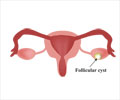Oophorectomy - FAQ's
1. Who performs a Oophorectomy ?A gynecologist performs Oophorectomy.
2. Why are the ovaries removed in women above 40 years who are under going hysterectomy operation?
Some physicians until the 1980's reasoned that a woman over 40 was approaching menopause would soon stop secreting estrogen and releasing eggs from the ovaries. Removing the ovaries would accelerate menopause by a few years however it would give them the advantage of reducing risks of cancers.
3. What are the affects of ovaries removal on the Body?
The current thinking towards preserving ovaries is increasing as the risks of ovarian cancer in women who have no family history of the disease is less than 1%.
Removing the ovaries increases the risk of cardiovascular disease and accelerates osteoporosis unless a woman takes prescribed hormone replacements. Hence there is no place for subjecting women to unnecessary removal of ovaries unless there is a surgical indication for the same
Genetic mutation of the two genes called BRCA1 or BRCA2 genes - are linked to breast cancer, ovarian cancer and some other cancers. In woman with strong family history of ovarian or breast cancers, preventive oophorectomy is sometimes recommended for those who are over 35 to 40 years and who have a completed their families.
The lifetime risk for developing ovarian cancer in women who have mutations in (genes) BRCA1 is 30% by age 60.
5. Can a woman conceive if one ovary is removed?
Yes she can conceive. As she will continue to produce eggs from the other ovary










